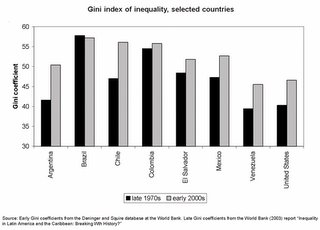The Washington Consensus and Income Inequality
I just finished scanning this article from EPI. I was struck by the further concentration of wealth into the upper income brackets, in some "model" Latin American countries.
"The Washington Consensus is the label given to the policy prescriptions championed by the international financial and trade institutions. (The International Monetary Fund (IMF), the World Bank, and the World Trade Organization (WTO) are sometimes collectively referred to as the Bretton Woods institutions, or BWIs.) These prescriptions were embraced by local elites throughout the Americas over the past two decades, often (but not always) under pressure from the BWIs. The exact parameters of the Washington Consensus exist in the eye of the beholder, but there are common broad elements that all agree form its central core: fiscal discipline, tax reform, interest rate liberalization, privatization (including foreign takeovers of domestic companies and resources), deregulation of product, labor, and financial markets, and trade liberalization. These policies were sold as a way to increase economic growth and productivity in their economies and to avoid the boom and bust cycles that characterized the 1970s. They have, inarguably, failed to deliver."
The Gini Index is one measure of income inequality: the higher it is , the more concentrated income is in the wealthier members of a society. Observe the change in Income Inequality from the late 1970s (black) to the early 2000s (gray). Chile (3rd from left) and Argentina (1st from left) are the countries most identified with the Washington Consensus, yet in the early 2000s, income inequality grew rapidly:
 The exception: Brazil (2nd from left), "... where inequality declined very slightly". Argentina went through an economic crisis, but I'm not sure what happened in Chile. Using this metric, the U.S. (1st from right) fared poorly as well.
The exception: Brazil (2nd from left), "... where inequality declined very slightly". Argentina went through an economic crisis, but I'm not sure what happened in Chile. Using this metric, the U.S. (1st from right) fared poorly as well.Hmmmm. These rough measures of income inequality, combined with objections over US Farm subsidies and tarrifs, no wonder the FTAA is encountering resistance.
Speaking of the Washington Consensus: Paul Blustein wrote excellent books on the IMF and Argentina, which are so engaging, they come through as thrillers. He notes that Argentina was widely acknowledged to have had fiscal problems years before its Financial Crisis -- and that there WERE debates inside the IMF. I hope that the IMF/World Bank staff start inviting members of the Environmental and Labor movements into some of their staff discussions. Free Trade agreements are not objectionable and theoretically they can be beneficial to countries who are part of them. The perception though is that while the point of view of corporations are well represented, the environmental and social justice sectors are not. Free Trade agreements affect everyone, and a growing segment of the population want sustainability and just working conditions taken into account.
Its like having an Energy Task force and inviting input from energy companies, and NOT inviting any environmentalists.


0 Comments:
Post a Comment
<< Home